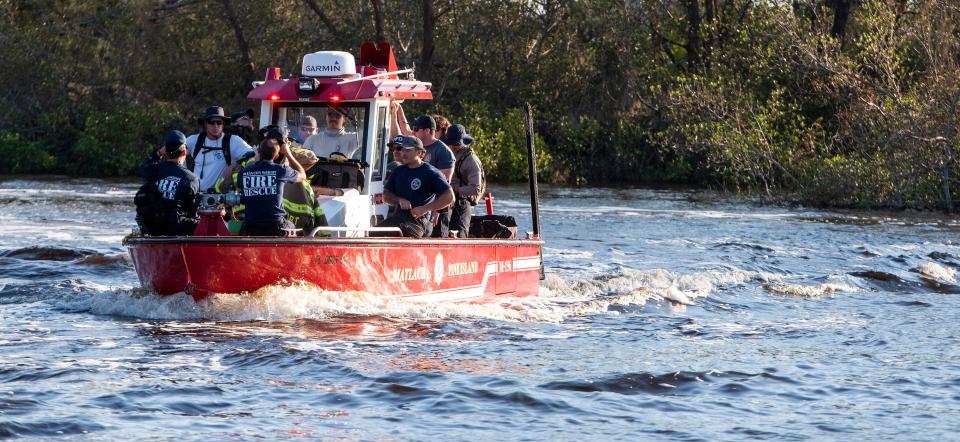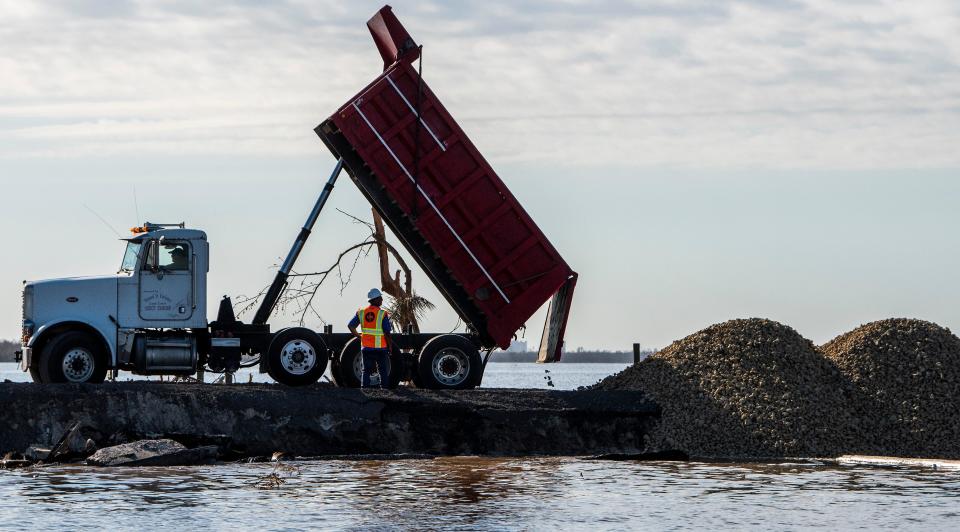Lessons learned: Pine Island, Matlacha leaders will never forget Hurricane Ian
For our special one-year anniversary coverage of Hurricane Ian, The News-Press and Naples Daily News reporters have had conversations with local leaders and officials about the important lessons that were learned and what's next for their communities. In this installment of the Hurricane Ian Lessons Learned Q&A's, Florida Investigative Reporter Kate Cimini shares highlights from her interview with Pine Island / Matlacha Fire Chief Ben Mickuleit and nonprofit civic group Matlacha Hookers President Joanne Correia and Secretary Julia Simpson.
Mickuleit, who responded to Hurricane Ian alongside his firefighters, has spent the entirety of his 19-year career with the Pine Island / Matlacha Fire station. He told The News-Press/Naples Daily News he was proud of the work his station did on the island, and was impressed with the swiftness of the aid his firefighters and the island received from Lee County, as well as supporting agencies.
What lessons did you and your firefighters learn from Ian?
Ben Mickuleit: All in all, we were pretty well-prepared. We actually split our equipment: we left half our equipment on the island and took half our equipment off-island because we were always worried about if something happened to the bridge.
What did you leave on the island?
Mickuleit: Our front-line apparatus, our fire engines and brush trucks, which are more versatile because they can go through higher standing water. We also have two boats, and we relocated them both to our station in Matlacha, so that's actually how we got back onto the island. (After Ian hit) we put down at D&D Marina (on Matlacha) and went all the way to the Yucatan (by boat). From the Yucatan, we walked all the way to the center. All the power poles were down and there was no means of transportation. Even if there was, the power poles were snapped all over the island and it wasn't safe. So five or six of us walked all the way to Station 1 at the center.
What was your biggest disadvantage during Ian, and did you overcome it? How?
Mickuleit: One thing we did learn with was the importance of communication, meaning internet. That was a challenge because we had to upload documents to local and state emergency operations centers. Cell phone service was almost nonexistent. We did have a satellite phone but it wasn't the greatest.
At the beginning, our system, our radios for dispatch, they worked pretty well. We had to call in because we needed certain equipment: medical equipment, fire equipment, whatever. And all our requests remain through the county − tarps, water, whatever else − it's all web-based, so we made hot spots out of our phones. Once the state provided us with Starlinks, that was phenomenal. So we used our phones at the beginning, but once we got Starlink it just sped up the process (of communicating needs to the state and county).
In addition to the Starlinks, AT&T actually dropped off a portable antenna in front of our station for cell service, which helped as well –– for those who had AT&T.
What does it mean when communication is down? How does that impact your ability to do work?
Mickuleit: We requested water, tarps, chainsaw crews, engine strike teams to help with search and rescue and street sweepers later on, to clean the streets. All these requests are put through a web-based system, so if you don't have internet or cell service that makes it very difficult to make requests.
Did Ian change the way you respond to hurricanes, or inform the way you responded to Idalia?
Mickuleit: We had a pretty solid plan in place and federal and state assets showed up pretty quickly. The next day we already had Urban Search & Rescue teams on the island assisting us. They dropped in with helicopters and a few days later we had the National Guard here.
Since Ian, we've updated our hurricane plan and we've bought Starlinks. Besides communication, our hurricane plan was actually pretty solid because we kept two shifts on duty, so when we were ready to go back, we had all the staffing (we needed) available to us.
Are there any weaknesses in the system that keep you up at night still? What are you thinking about when you wake up at 3 a.m.?
Mickuleit: The things that keep a lot of us up at night is the people who didn't evacuate. During that time, we transferred the station's phone calls to our own cell phones. And the calls for help we got from people whose homes were filling with water and they couldn't get out, that was pretty traumatizing. I think that is going to take a long for us time to heal from. It did so much damage.

'We're on our own'
The News-Press/Naples Daily News also spoke with leaders of the Matlacha Hookers, a women’s civic organization that has given away close to $200,000 in building supplies and financial aid to Pine Islanders and businesses. The nonprofit also coordinated relief drop-offs in the early days after the hurricane, provided food and water, purchased gas and diesel for islanders and some of their members even housed residents in their own homes.
Pine Island is unincorporated, meaning it has no local government to advocate for its needs to the county. As a result, the Matlacha Hookers often fill in the role of local civic relief. Correia and Simpson's roles in the community led them to a very different perspective on Ian’s impact and the lessons they, and their community learned.
What keeps you up at night?
Julia Simpson: The people that, you know, still are just struggling. The threat of another hurricane coming through, that's always there. But it's just the people that are still out there that really need assistance: how are we going to help these people now?
Joanne Correia: Labor is a big problem. We can throw sheetrock on the island but we have nobody to put it up. The average age is in the mid-60s (and can’t rebuild their homes themselves) and it's a very working island; we're not really rich people. So the rich people who have second homes on the island have already used our labor and are consuming all the resources for themselves and, and the rest can't afford or find that labor.
On top of that, the cost of being able to live on the island has doubled.
What do you think needs to be a priority for the state or county on Pine Island and Matlacha in order to move these communities forward?
Simpson: It would be good to have the manpower to be able to help those that are still in need of major rebuilding, so they can live in their homes. There are a lot of great resources out there but it's hard for a lot of people to tap into them, because they don't have the case managers to help. Without case management, it becomes a very daunting task.
Correia: After the hurricane, a lot of resources come in, but they leave too early. We need services still (like) laundry, honey bucket services … and the ability to take a shower. All those services are gone.
The last thing is: we need more mental health services. There are a lot of people on the island that are just fighting to survive right now. Those people need some help.
Why do you think your priorities haven't been met?
Correia: The island residents that need help tend to be older. They don’t do social media. We don’t have a radio station. We have literally fought with the (island's weekly) newspaper to start delivering newspapers back to their houses again. A lot of them still use flip phones. Technology was a huge issue for these people to even apply for stuff. They have no idea they can get help because even if the caseworker is available (the information isn’t getting to them) … and the island is long.
So if you’re living in one of those trailers that got slammed and you spent 18 hours on your counter because you didn’t want to drown, but all your services are ten miles away? Those people are hurting.
What's the main lesson Hurricane Ian taught you?
Correia: The reality is without a town and without incorporation, there's nobody in charge. Without anybody in charge, it's really hard to coordinate and say this is what's going on. We didn't have a single voice (to speak for us) and we needed a single voice.
If we didn't have the boys and the companies that we have on our island to fix ourselves, we would be even in worse shape.
You asked what’s the main lesson Hurricane Ian taught us? We’re on our own.

This article originally appeared on Fort Myers News-Press: Pine Island, Matlacha leaders will never forget Hurricane Ian

